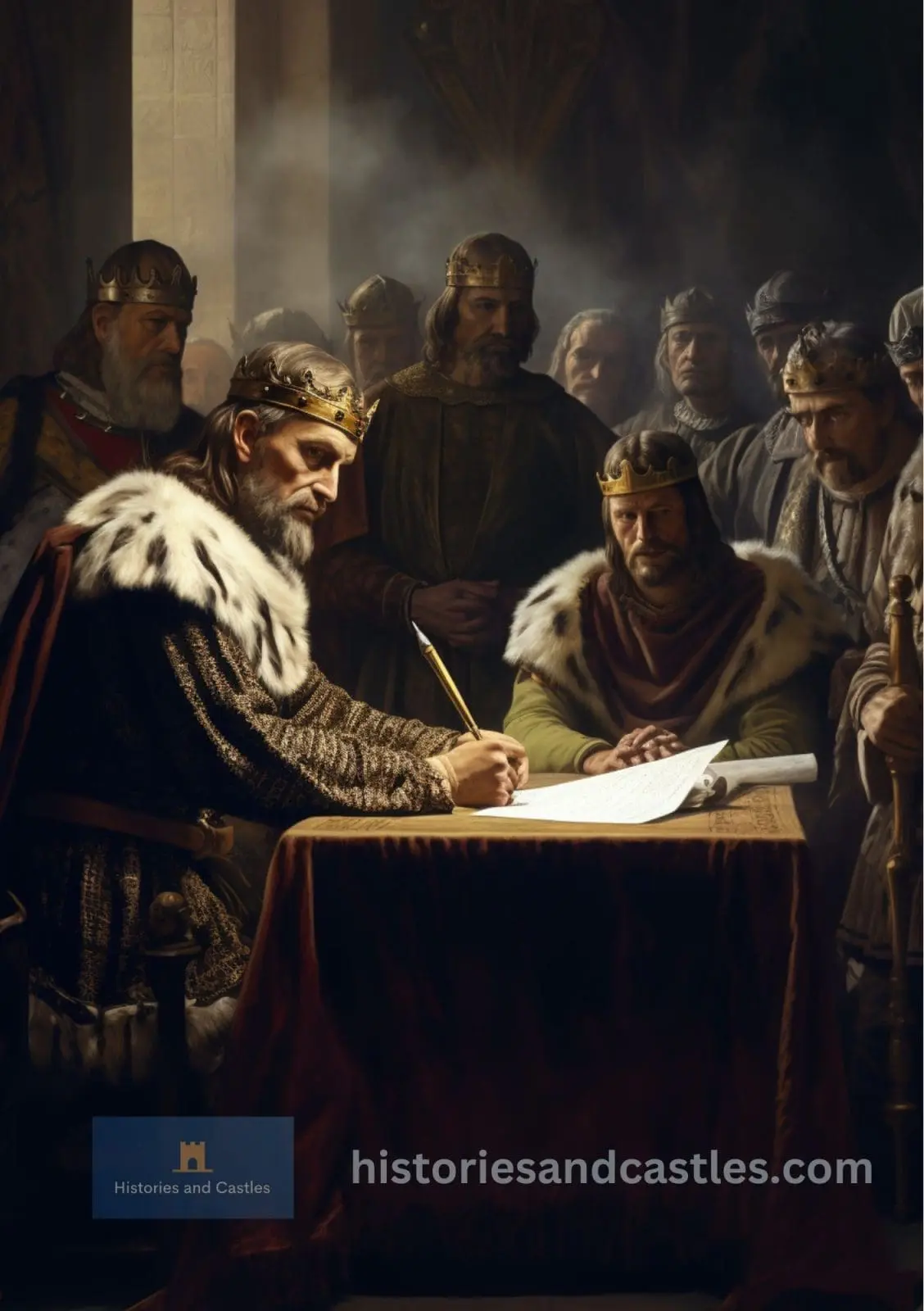Your basket is currently empty!

What If King John Refused to Sign the Magna Carta?
A King at the Crossroads
In June 1215, the meadows of Runnymede became the stage for one of history’s defining moments: the sealing of the Magna Carta. King John, a ruler infamous for his missteps and misrule, faced a coalition of rebellious barons demanding limits on his power. But what if John, stubborn and defiant, had refused to affix his seal to this groundbreaking document? The consequences would have rippled through England’s castles, courts, and battlefields, potentially reshaping the nation’s history. Let’s explore this alternate timeline—and the chaos that might have ensued.
The Powder Keg of 1215: Why Refusal Wasn’t an Option
By 1215, King John’s reign was a house of cards teetering on collapse. Nicknamed “Softsword” for his military flops—like losing Normandy to France in 1204—he’d alienated his barons with heavy taxes to fund failed wars and arbitrary seizures of their lands. His treasury was nearly empty, his reputation in tatters. The barons, a powerful and increasingly unified faction, had had enough. They captured London in May 1215, forcing John to negotiate at Runnymede.
The Magna Carta wasn’t a polite request—it was an ultimatum. Refusing it outright would’ve been like tossing a torch into a barrel of gunpowder. The barons weren’t just disgruntled nobles; they were armed, organized, and ready to topple a king. John’s agreement to the charter bought him time, but a flat refusal would’ve signaled war. And not just any war—a civil war with foreign stakes.
Escalation: The Barons Strike Back
Without the Magna Carta, the barons wouldn’t have retreated to their castles to sulk. They’d already shown their teeth by seizing London, and they had a trump card: Prince Louis of France. In our real timeline, after John backtracked on the Magna Carta later in 1215, the barons invited Louis to claim the English throne. He landed in 1216, backed by a significant chunk of England’s nobility. A refusal in June 1215 might’ve sped up this timeline.
Imagine the scene: baronial forces, bolstered by French troops, marching on John’s strongholds. Castles like Dover and Windsor, loyal to the king, would’ve faced sieges. John, already struggling to pay his mercenaries, might’ve lost key allies as their patience—and gold—ran out. The First Barons’ War, which historically flared after John’s reneging, would’ve exploded earlier and fiercer, with London as the rebel capital.
A French King in England’s Castles?
If John had held firm and lost, Prince Louis could’ve sat on England’s throne by 1216 or sooner. In reality, Louis controlled London and much of the southeast before John’s death in October 1216 shifted the tide. A refusal at Runnymede might’ve tipped the scales faster—John’s dwindling loyalists, seeing no compromise, could’ve defected. Picture Westminster Abbey hosting a French coronation, and England’s feudal system bending under Capetian rule.
This wouldn’t have been permanent—Louis faced resistance even in the real timeline, and English nobles weren’t keen on a foreign overlord. But a successful early coup might’ve entrenched French influence, tweaking England’s monarchy, laws, and even castle-building traditions (think more Norman-style keeps). The Plantagenet dynasty, John’s line, could’ve ended decades early, reshaping medieval Europe’s power plays.
The Magna Carta’s Ghost: Ideas That Wouldn’t Die
Even if John refused and lost, the Magna Carta’s spirit wouldn’t have vanished. It wasn’t a fluke—it crystallized a growing demand for royal accountability. The barons wanted their rights codified: no taxation without consent, fair justice, protection from arbitrary arrest. These weren’t whims; they reflected a shifting feudal world where nobles wielded more clout and kings couldn’t rule unchecked.
A victorious Louis or a battered John might’ve faced a second reckoning. If Louis took power, English barons would’ve pressed him for similar concessions—ironic, given his French roots. If John somehow clung on, battered but alive, the pressure wouldn’t relent. The Magna Carta might’ve emerged later, bloodier, perhaps under a different name, but its core ideas were too potent to suppress. Castles like Kenilworth, epicenters of later rebellions, would’ve remained hotbeds of resistance.
John’s Gamble: Could He Have Survived?
Could John have defied the barons and kept his crown? It’s a long shot. His military track record was dismal—Normandy’s loss still stung, and his campaigns in Wales and Ireland floundered. His coffers were drained, and his knack for making enemies left him few friends. A refusal might’ve rallied some die-hard loyalists, especially in the royal strongholds of the Midlands, but it’s hard to see him outlasting a united baronial-French alliance.
His best bet would’ve been stalling—feigning negotiation while scrambling for foreign aid, perhaps from the Holy Roman Emperor or the Pope (who later annulled the Magna Carta anyway). But John wasn’t known for cunning diplomacy. His stubborn streak, evident in his real-life quarrels, suggests he’d have doubled down, lost, and faded into history as a deposed tyrant.
A Legacy Forged in Chaos
King John’s grudging seal on the Magna Carta staved off immediate disaster, but a refusal would’ve plunged England into a darker storm. Civil war, a potential French king, and a delayed but inevitable push for rights would’ve marked this alternate path. The castles dotting England’s landscape—Dover, Windsor, Kenilworth—would’ve borne witness to sieges and shifting allegiances, their stone walls echoing a nation remade.
The Magna Carta, even unsigned, was a spark that couldn’t be snuffed out. Its principles outlived John, shaping law and governance for centuries. So, while a refusal might’ve changed the timeline, the tide of history was already turning—whether John liked it or not. What do you think—could a king so despised have defied the inevitable?

Elevate your wardrobe with our exquisite Magna Carta T-Shirt, a sophisticated homage to the enduring legacy of liberty since 1215. Crafted from luxuriously soft cotton, this vintage tee embodies both comfort and style, making it a perfect addition to your casual wear collection.
Magna Carta t-shirt collection, ideal for history buffs, history lovers and history teachers.
Discover more from Histories and Castles
Subscribe to get the latest posts sent to your email.











